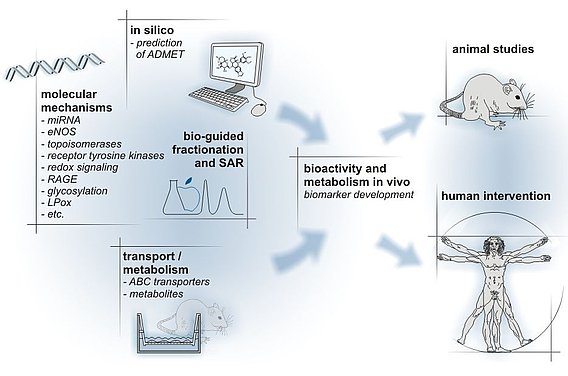Description
Many classes of natural compounds exhibit bioactivity. However, their mechanisms of action, especially the affected biological targets have often not been identified. Therefore, all research groups of the IK will focus on mode-of-action studies of natural compounds and/or derivatives. Within the IK, a broad spectrum of in vitro assays will be available to the consortium members and the enrolled PhD students. In addition, the IK takes into account that the in vivo bioactivity of compounds largely depends on the absorption in the gastrointestinal tract, the distribution, metabolism, elimination and toxicity (ADMET). The metabolism of compounds in a biological system might give rise to biologically active substances but might also be associated with a loss of bioactivity or even may result in metabolites mediating adverse effects. Therefore, it is crucial to include methodology for ADMET determination and prediction as well as the characterization of metabolites. Both will be central points of this IK, addressed by a complementary method spectrum.

Education and Training Concept
The impact envisaged by the BioProMoTION consortium is to create a Vienna-based framework for excellent teaching and training of PhD students, in order to increase the employability of graduate students of the University of Vienna. The network intends to create a comprehensive training schedule that allows the students to communicate with and learn from a broad panel of experts in the field. Mutual benefit from each other will yield a strong added value to the scientific community in Austria and thus strengthen competitiveness.
All members of the Initiative Group are strongly committed to the education of future generations of scientists in Chemistry, Pharmacy and Nutritional Sciences. This commitment is the basis for this multidisciplinary IK proposal and also for the added value to the fellows within this consortium. One major pillar of the PhD program is the supervision of a PhD student by a Core Mentoring Group (CMG) of at least 2, preferably 3 supervisors, unlike in “normal” PhD programs within the University of Vienna with usually a single supervisor being responsible for a PhD student. The topics of the PhD theses, each being presented as a specific project (see below), are designed to meet the research priorities of the supervisor, however, special attention has been drawn to complementarities of methods and technologies offered within the consortium. The CMG members’ expertise must be related to the topic of the PhD thesis. In addition to the guidance by the primary supervisor, the CMG will meet 3-4 times per year to discuss the progress of the thesis with the PhD student. At the beginning of the PhD thesis, the CMG panel will develop a personalized curriculum for the student (and adapt it each semester, including discussion of course scores, work progress, preparation of manuscripts, etc.), considering the needs and wishes of the candidate. Together with the training events described below (e.g., lab rotation and stays abroad), this will ensure that the students gain broad technical experience and thus guarantee maximum benefit for the students.
Währinger Str. 38
1090 Wien
Raum 1218
T: +43-1-4277-708 09




